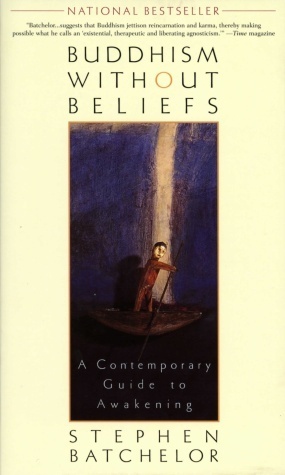📒 Buddhism without Beliefs
Buddhism without Beliefs: A Contemporary Guide to Awake…
A national bestseller and acclaimed guide to Buddhism f…

This book was rather difficult to read. The language is complex and the ideas are expressed metaphorically. The author clearly wasn’t trying to be simple or clear; he was trying to be deep and, at times, enigmatic. He succeeded in that, but still, a few interesting thoughts can be drawn from this web of ideas and meanings:
- Buddhism was not originally a religion but acquired faith-based elements during its evolution, because back then there was no strong scientific foundation, and faith was the natural basis for its preservation.
- The “religionization” of Buddhism made enlightenment (awakening) into something difficult to access, although the Buddha himself didn’t think so. He said that anyone could reach this state.
- The Buddhist perception of life and death coincides with that in Bulgakov’s The Master and Margarita (which I love): “Since death alone is certain and the time of death uncertain, what should I do?”
- Dharma is not what you believe, but what you do.
- In many schools of Buddhism, the authority of Dharma was gradually replaced by the authority of the guru.
- Life can be seen as an unfolding narrative. Each life is unique, a story we ourselves create, and it will never repeat. It is a unique novel. And we can approach it not too seriously, but with playfulness, irony, and a smile (for some reason, this again reminded me of Bulgakov’s works).
- Buddhism blends beautifully with agnosticism and even atheism. Win.
A couple of quotes:
In taking life for granted, we likewise fail to notice it.
…
ANGUISH emerges from craving for life to be other than it is.
…
our actions will reverberate beyond our deaths. Irrespective of our personal survival, the legacy of our thoughts, words, and deeds will continue through the impressions we leave behind in the lives of those we have influenced or touched in any way.
…
Self-confidence is not a form of arrogance. It is trust in our capacity to awaken. It is both the courage to face whatever life throws at us without losing equanimity, and the humility to treat every situation we encounter as one from which we can learn.
…
Instead of creatively realizing their freedoms, many choose the unreflective conformism dictated by television, indulgence in mass-consumerism, or numbing their feelings of alienation and anguish with drugs. In theory, freedom may be held in high regard; in practice it is experienced as a dizzying loss of meaning and direction

